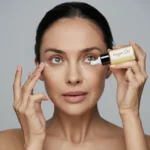At a glance: Discover if evening primrose oil (EPO) can truly lighten your skin. Experts weigh in on its benefits for hydration and inflammation. however, scientific evidence supporting the effects of primrose oil for skin lightening is limited. Explore the latest insights and user experiences to make an informed decision about incorporating EPO into your skincare routine.
Have you ever found yourself experimenting with various skin-lightening ingredients, hoping to discover the perfect solution for a brighter complexion?
If so, you’re not alone.
Many of us are constantly on the lookout for effective ways to even out skin tone and diminish dark spots.
In today’s skincare journey, we’re diving into the world of evening primrose oil (EPO) – a popular contender touted for its numerous skin benefits.
But does it truly lighten the skin as some claim?
Expert opinion on evening primrose oil for skin lightening
Are you curious if evening primrose oil (EPO) can lighten your skin tone? Dr. Sheila Farhang has some thoughts.
While EPO is fantastic for moisturizing and fighting inflammation, the evidence supporting its skin-lightening abilities is limited.
As Dr. Farhang puts it,
“There are claims that EPO can brighten skin tone and help with acne scars, but I think there are more effective ingredients for achieving that purpose.”(Byrdie) (Avant Dermatology).
The team at Curology agrees. EPO’s anti-inflammatory properties might theoretically help with acne and dark spots.
But guess what?
The scientific evidence just isn’t strong enough to make bold claims about its skin-lightening benefits.(Curology).
Related: Natural Skin Lightening Ingredients You Never Knew Could Lighten Skin
Natalie Aguilar, a dermatological nurse, and licensed esthetician, brings up a good point.
EPO is loaded with fatty acids, making it great for boosting your skin’s moisture barrier and evening out your skin tone.
Yet, she also notes that its specific skin-lightening effects are still up in the air. (Avant Dermatology).
Truly Beauty Experts acknowledge that EPO has been used traditionally for various skin issues. The site says EPO might improve skin tone because of its linoleic acid, which promotes cell turnover and reduces dark spots.
But, let’s be real, the evidence is mostly anecdotal. (Truly Beauty).
In a nutshell, evening primrose oil has many skin benefits, like hydration and fighting inflammation.
Yet, when it comes to skin lightening, scientific evidence is thin.
Studies on evening primrose oil for skin lightening
When it comes to using evening primrose oil (EPO) for lightening skin, the scientific evidence is pretty sparse.
Wondering what the research actually says? Let’s break it down.
General Skin Perks
EPO is celebrated for its broad skin benefits. Several studies have zoomed in on its anti-inflammatory properties and its ability to bolster skin barrier function.
For example, a review in BMC Complementary Medicine and Therapies praises EPO for reducing inflammation, which is great for conditions like eczema. But, the studies don’t really touch on skin lightening.
Tackling Hyperpigmentation
Research hints that EPO might help with hyperpigmentation by boosting overall skin health.
However, direct evidence from controlled studies specifically targeting EPO’s skin-lightening capabilities? Almost non-existent.
A study in the Journal of Oleo Science discusses the antioxidant effects of GLA, a key component of EPO.
While this could help combat oxidative stress (a contributor to skin darkening), the study doesn’t go as far as confirming any skin-lightening benefits.
Inhibiting Melanogenesis
There’s intriguing data, though! A study published on SpringerLink found that saponified EPO (a modified form) can inhibit melanin production in melanoma cells.
However, the findings are preliminary. They’re mostly lab-based and not backed by real-life clinical trials yet.
Simply put, there’s a glaring lack of direct evidence or high-quality clinical trials that definitively explore evening primerose oil’s effectiveness for skin lightening.
Most current studies revolve around its anti-inflammatory and general skin health benefits.
So, for now, the idea that EPO effectively lightens skin is largely unsupported by science.
Evening primrose oil does offer several recognized benefits for your skin, thanks to its anti-inflammatory and moisturizing properties.
But if you’re looking to lighten your skin specifically, the scientific backing just isn’t there yet.
More targeted research is needed to settle this question once and for all.
Is EPO worth a try for other skin benefits? Absolutely. But for skin lightening? You might want to keep exploring other options.
User Experiences on the Effectiveness of Evening Primerose Oil for Skin Lightening
When using evening primrose oil (EPO) for skin lightening, user experiences on YouTube provide a variety of personal insights. Here are videos where real users share their results and conclusions on this topic:
Evening primrose oil benefits and properties
https://www.youtube.com/watch?v=bccpVlQv-4o
According to the video, EPO contains gamma-linolenic acid (GLA), an omega-6 fatty acid that keeps the skin healthy…
The oil may improve overall skin health, giving you that much-coveted glow.
For skin lightening benefits, use evening primerose oil with other oils like argan, lemon, lavender, and carrot seed.
These combinations can enhance its skin-lightening and moisturizing effects.
Natural Acne Solution
https://www.youtube.com/watch?v=tyHQblZ3rgU
Quick takeaways:
- In the video, Dr. Batra suggests that Evening primrose oil contains omega-six fatty acids, particularly linolenic acid, which aids in skin barrier restoration.
- Topical application of primrose oil can help soothe and calm irritated skin, promoting healing.
- Leaving primrose oil on overnight can effectively treat blemishes by morning.
- Some people also take evening primrose oil orally for its broader health benefits beyond skincare.
- It’s considered an alternative to traditional acne treatments like salicylic acid
Evening Primrose Oil: Real User Experiences
Evening primrose oil (EPO) has garnered attention for its potential benefits in skincare, particularly for lightening acne scars and hyperpigmentation.
Here’s what some users from various skincare communities have shared about their experiences:
-
Subtle but Noticeable Improvements
“I’ve been using evening primrose oil for a few months, and I’ve noticed a slight lightening in my acne scars. It’s not a dramatic change, but my skin tone looks more even overall.” – Facebook User from the Skincare Addicts Group
-
Significant Reduction in Hyperpigmentation
“EPO has been a game-changer for me. My hyperpigmentation has faded since I started incorporating it into my nightly routine.” – Facebook User from the Natural Skincare Tips Group
-
Healthier and More Radiant Skin
“I tried evening primrose oil after reading about its benefits. While it didn’t lighten my skin, it did make my skin look healthier and more radiant.” – Facebook User from the Beauty Tips & Secrets Group
-
Reducing Redness and Evening out Skin Tone
“Evening primrose oil didn’t work miracles for my skin lightening, but it did help reduce redness and even out my skin tone a bit.” – Facebook User from the DIY Skincare Enthusiasts Page
What users from various social forums are saying about the effectiveness of evening primrose oil for skin lightening
- Acne.org – In a discussion on evening primrose oil, a user mentioned they noticed an improvement in their overall skin tone and a reduction in redness after using it regularly. [1].
- Skin Care Talk – On this skincare forum, users discuss applying evening primrose oil both topically and taking it internally. They report benefits like reduced inflammation and an improved skin barrier. One user specifically mentioned seeing better results with evening primrose oil compared to plain vitamin E [3].
- Beautymunsta – This site includes a detailed discussion on using evening primrose oil for lightening skin. IA popular method shared is mixing evening primrose oil with other oils like argan and essential oils for enhanced effects [4].
- RealSelf – while it may not be a direct skin lightening agent, its anti-inflammatory and moisturizing properties helped improve skin tone. 5
Is Evening Primerose oil Effective for Skin Lightening?
Based on scientific sources, evening primrose oil (EPO) may not be effective for skin lightening.
Scientific evidence specifically supporting its ability to lighten skin is sparse.
Experts like dermatologists and skincare professionals agree that while EPO might offer some benefits like enhancing skin hydration and barrier function.
Still, there’s a lack of robust clinical trials confirming its effectiveness for lightening skin.
So, if you’re specifically looking for a product to lighten your skin, it might be worth exploring other options with stronger scientific backing.
Frequently Asked Questions (FAQs)
Here are some frequently asked questions (FAQs) about evening primrose oil for skin lightening:
How does evening primrose oil help with skin lightening?
EPO helps reduce inflammation, soothe irritated skin, and promote a more even skin tone.
However, there is no scientific evidence concerning the effectiveness of evening primerose oil for skin lightening. (Gya Labs) (VedaOils).
How should evening primrose oil be applied for skin lightening?
EPO can be applied directly to the skin, mixed with moisturizers, or used in DIY serums. For best results, apply a few drops to clean skin before bedtime. Alternatively, blend it with a carrier oil like jojoba or rosehip oil for enhanced benefits(Gya Labs) (Oils we love).
How long does it take to see results from using evening primrose oil on the skin?
The time frame varies. Some people notice improvements in skin texture and tone within a few weeks, while for others, it might take a few months.
Consistency is key, so regular application is recommended(STYLECRAZE).
Is evening primrose oil suitable for all skin types?
While EPO is generally safe for most skin types, its thick nature might not be ideal for very oily or acne-prone skin.
It’s best to do a patch test first to ensure it doesn’t cause any adverse reactions(STYLECRAZE).
Potential side Effects of Evening Primrose Oil on Skin
Some people may experience skin irritation, redness, or rashes when using EPO topically. Allergic reactions, including hives and swelling, can occur but are rare.
Sources:

I’m a devoted organic skincare enthusiast, passionate about the natural, wholesome goodness that organic products bring to our skin.
Organic skincare isn’t just a hobby for me—it’s a lifestyle. Every product I use, recommend, and write about has been carefully chosen for its purity and effectiveness. Everything I write about is backed by scientific studies, dermatologists’ opinions, and user experiences.
I also excel at tackling skincare challenges with innovative, organic solutions.


